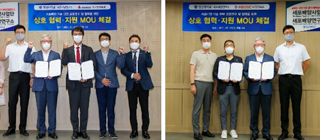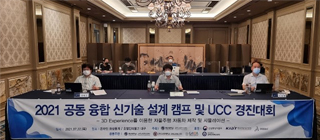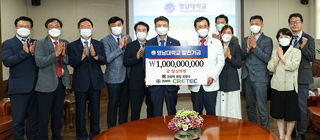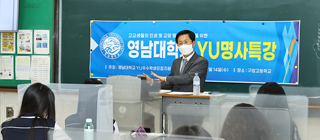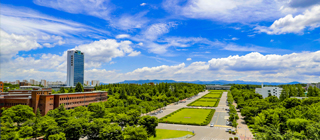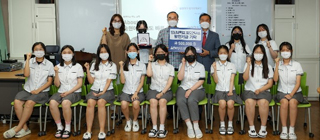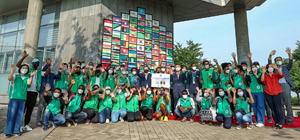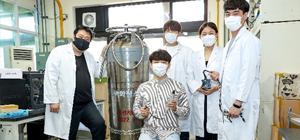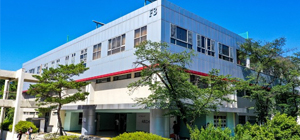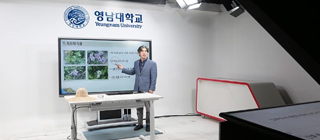-
YU Research Institute of Cell Culture enters joint research agreement with specialized corporations such as Neo-Cremar and T-Ribose Pursuing localization research of core materials and technologies for ‘cell culture medium’ that depends completely on imports costing 400 billion KRW a year Requires government-academic-industrial cooperation to create new industries and lead the bio-industry [July 22, 2021] The bio industry research led by the YU Research Institute of Cell Culture (Chief Choi In-ho) will gain momentum in its technological commercialization. On the 21st, the YU Research Institute of Cell Culture entered joint research agreements for the development of core materials and technologies related to the cell culturing industry with two specialized companies such as Neo-Cremar (CEO Kim Jae-hwan) and T-Ribose (CEO Kim Yong-gwan). Neo-Cremar is the only functional food materials company in Korea listed in KOSDAQ. It is currently actively researching alternative meats and it is planning to launch vegan meat made with plant-based proteins. With this MOU, it plans to commercialized cultured meat through joint research with YU to pioneer not only the domestic market, but also overseas markets. T-Ribose is a newly established company aiming for the localization of cell culturing medium, and it is constructing a GMP (Good Manufacturing Practice; rules for manufacturing and quality management of pharmaceutical products, etc.) needed for producing cell culturing mediums in the Uiseong Bio Valley that is currently being constructed in Uiseong-gun, Gyeongbuk. Cell culturing technology is involved with growing animal cells outside of its body and it is a core technology used not only for basic research (basic life science, medicine, pharmacology, etc.), but is also used heavily by companies that produce biopharmaceutical products (antibody, vaccines, protein, stem cell medicine, etc.). The best-known case is the production of coronavirus vaccines using cell culturing by SK Bioscience, and in Korea, Samsung Biologics and Celltrion have the nation's largest culturing facilities needed for producing bio-medicine. In addition, if production of ‘cultured meat (meat produced by culturing muscle stem cells)’ that has recently become a big issue is realized in the near future, it is expected that the rate of cell culturing in the bio industry will grow. This is why the industry-academic joint research agreement between YU that has the nation’s best research and technological capacities in cell culturing and companies with expertise in relevant fields is gaining so much attention. Department of Medical Biotechnology Professor Choi In-ho, who heads the YU Research Institute of Cell Culture, stated, “The history of bio-industries in Korea is relatively short, but has made remarkable achievements. But ironically, compared to the scale of cell culturing facilities in Korea, it still depends almost completely on imports for actual cell culturing.” He added, “Especially in the case of ‘cell culturing medium’ that is basically the food for growing cells, the amount imported by Korea is about 400 billion KRW per year. It is expected that demand will grow with the development of the bio-industry in the future, but in reality, we are still importing most of the raw materials needed for producing mediums.” In order to lead the bio-industry, which is a cash crop for the future, assertive cooperation is needed from not only best-known universities and companies, but also the central and local governments.” Professor Choi has been planning various businesses for the construction of the domestic infrastructure, as well as in the development of core raw materials and technologies that are essential for cell culturing together with Gyeongsangbuk-do and Uiseong-gun since 2016. Professor Choi founded the Research Institute of Cell Culture that is joined by professors in medical biotechnology, food engineering, pharmacology, and chemical engineering as researchers back in 2017. The YU Research Institute of Cell Culture was selected as the ‘College Central Research Support Project in Science and Engineering’ by the Ministry of Education in 2020, and it will receive funding from the central and local governments for nine years until 2029, and is thus spurring its efforts to develop core technologies and materials needed for cell culturing. Professor Choi said, “The YU Research Institute of Cell Culture, Neo-Cremar and T-Ribose are developing exclusive mediums for cultured meat through joint research. The industry-academic-government cooperation will create new industries for the local society and it will serve as a hub for core materials and technology development of the domestic cell culturing industry.
-
‘Digital Twin’ technology-applied autonomous vehicle design and simulation contest held Sponsored by the YU Engineering Education Innovation Center and co-hosted by engineering education innovation centers of four major universities in Korea Constructing a collaborative education system between global companies and universities [August 4, 2021] The YU Engineering Education Innovation Center hosted the ‘2021 Joint Convergence New Technology Design Camp and UCC Contest.’ This contest, which was sponsored by the YU Engineering Education Innovation Center and co-hosted by the engineering education innovation centers of the Korea National University of Transportation, Hall University, and Hongik University, was the nation’s first joint convergence new technology design camp that used digital twin technologies to construct an education collaboration system and to design and simulate autonomous vehicles in cyber space. It was held in cyber space for a week from July 14 to 21 and the design contest was held at the Daegu Interburgo on July 22. This is the first time that multiple universities constructed an education and collaboration system in cyber space to provide engineering education for fostering human resources in autonomous vehicles, while hosting production contests. In this contest, an autonomous driving education platform produced using the ‘3D EXPERIENCE Academic Platform’ of the global digital twin company Dassault System and its affiliate Hana TS, and expert mentoring in digital twin engineering were utilized. Participants of the contest produced autonomous vehicles at a 1/10 size in cyber space using digital twin-based engineering. <Model of autonomous vehicle made using digital twin technologies (second place winner by the YU Team)> The grand prize went to the Halla Team (Bang Min-hyeok, Yeom Gwang-mo, Han Neul-chan) and the YU Team (Moon Jong-ho, Baek Yun-gyun, Yoon Do-hyun) won second place. Digital twin technology is an essential technology that has recently been used for producing autonomous vehicles, and it produces and tests the entire production process including product planning, design and assembly in a virtual environment, which can significantly reduce production periods and expenses. This technology has been reducing the production period of new vehicles by a year and a half. Through this education collaboration system, it is expected that students will be able to use digital twin technologies to continuously experience automobile engineering, simulation, and production processes, as well as autonomous driving and virtual tests through collaboration that is being emphasized in the new mobility sector. YU Engineering Education Innovation Center Director Kang Dong-jin (Professor of Mechanical Engineering) who hosted this event commented, “We constructed a collaboration system to provide direct education and experience for students in digital innovation and conversion through the collaboration of multiple universities and global companies. We will provide full support so that many students can experience the latest fourth industrial revolution technologies through continuous exchange and reach-out programs.”
-
Chairman Choi Young-soo built it as a top company with ‘responsible management’, “We will do all our corporate social responsibility” The fund scheduled to be used for constructing educational infrastructure for the School of Mechanical Engineering... Interest in fostering human resources [July 15, 2021] Korea’s largest industrial tool distribution company, Cretec (Chairman Choi Young-soo/Daegu Saemaul Association Chair) donated 1 billion KRW in development funds to YU (President CHOI Oe-chool). Cretec recently donated 500 million KRW to YU in development funds and is scheduled to donate 50 million KRW a year for the next 10 years. At 11 a.m. on the 15th, Crete Chairman Choi Young-soo who attended the development fund donation ceremony held at the YU President's Reception Room said, “As a local businessman, I am well aware of the importance of fostering local human resources.Since 50 years ago when I first started this company, our motto was responsible management. In addition to unlimited responsibility for customers, corporate social responsibility is another thing that the owner should pay attention to. As a local businessman, I will do my best in my position to develop and coexist together with the local community. I ask YU to do its best to foster human resources that will be the next leaders of Korea.” YU President CHOI Oe-chool responded, “I feel a grave sense of responsibility as the president that manages the university because of this generous donation of development funds. There are many difficulties surrounding the university, but the support from people like Chairman Choi for our school is very encouraging.” He added, “Just as how Chairman Choi built Cretec to what it is today through ‘responsible management’, YU will also do its best to fulfill its social responsibility as champions for fostering human resources who will lead the future.” Cretec has been continuously engaged in social contribution activities to foster future human resources such as elementary, middle and high school students by donating 100 million KRW to a local high school in Daegu recently, in addition to its donation to YU. YU plans to use the development funds donated by Chairman Choi for education and research activities and constructing educational infrastructure for the School of Mechanical Engineering. Cretec, which was founded in 1971, is Korea’s largest industrial tool distribution company that is based in Daegu. It imports over 13,000 different items from about 1,200 brands all around the world, and distribute it to distribution companies and industrial sites in Korea. Crete is analyzed to have contributed to developing the domestic tools industry into world-class levels by categorizing and systemizing massive amounts of industrial tool product information, and constructing a scientific distribution network. It was the first in the tool industry to implement standard pricing and a bar code system, and it also offers online orders, while realizing digitalization of product information, thus making non-face-to-face business possible for industrial tools. In particular, the “Korean Industrial Tool Handbook’ that Cretec has been publishing since 1989 has been serving as an encyclopedia for tools, and it has become a standard book for tool distributors and manufacturers. Last year, Cretec was recognized for its contributions to the development of the industry, and thus received the ‘Korean Distribution Awards Presidential Medal,’ which is the highest honor in the domestic distribution sector.
-
Over 60 lecture requests from 10 high schools in the Daegu and Gyeongbuk regions 48 lectures held in various fields including humanities, social science, engineering, medicine, biotechnology, and arts Various lectures that can help youths elevate their character and abilities, and to choose their career paths [July 19, 2021] The best humanities lectures of YU (President CHOI Oe-chool) can now be taken at high schools. By applying to the ‘YU Celebrity Speaker’ that YU is offering for the first time this year, YU professors will visit the high schools and take the podium. This program, which aims at helping to enhance the character and general education of middle and high school students and to provide the opportunity to explore career options, is very popular among middle and high school students. It made news by having well-known professors for outstanding lectures at YU will take the podium at middle and high school students. The ‘YU Star Lectures’ that was first held on June 9 has received over 60 applications from 10 high schools in the Daegu and Gyeongbuk regions such as Siji High School, Songhyeon Girls’ High School, Kyungpook National University High School, and Guam High School, and lectures are scheduled until August. Daegu Guam High School Principal Cho I-young said, “Currently, the classes available for high school students at school have limited diversity. But through the ‘YU Star Lectures’, students can gain knowledge in various areas and take liberal arts lectures as they desire. Furthermore, it will be a precious opportunity to get an indirect experience for liberal arts lectures at universities that they will later attend.” YU is offering the ‘YU Star Lectures’ using creative experience activities and after-school hours at middle and high schools. There are a total of 48 lectures from 45 professors in various fields including humanities, social science, engineering, medicine, biotechnology, and arts such as ‘American Heroism Read in Marvel Movies (Professor of English and English Literature Nam Jung-seop)’, ‘Do Geniuses Exist? (Professor of Media and Communication Joo Hyung-il)’, ‘Future Automobile Career Exploration (Professor of Future Automobile Engineering Sa Jong-yeop)’, ‘Latest AI Technologies and Semiconductors (Professor Electronic Engineering Choi Hyun-cheol)’, ‘COVID-19 Pandemic: Hidden Stories (Professor of Medicine Lee Tae-yoon)’, ‘Song Master Class (Professor of Voice Lee Hyun)’, etc. Meanwhile, plans are to expand participating faculty for the ‘YU Star Lectures’ and also organize online lectures for contact-free special lectures to provide an assortment of lectures available. Middle and high schools that want to receive the outstanding lectures of YU can fill out an application and send it via e-mail(yustar@ynu.ac.kr). Details are available at the YU admissions homepage (www.enter.yu.ac.kr) or you may contact the YU Admissions Office (053-810-1088). YU Admissions Office Director Shin Yong-ho said, "Professors of YU are giving lectures to youths at their eye level with wide-ranging topics from liberal arts such as humanities, arts and science, easy and fun introduction if majors, and recent social issues such as AI and the COVID-19 pandemic, and have thus been quite popular.” He said, “We will listen to the opinions of education recipients such as adolescents and middle and high schools, and provide an assortment of exchange activities between colleges and middle and high schools to create programs that can help students select their career paths.”
-
Institute of Information & Communication and Institute of Life Sciences to receive a total of 14.7 billion KRW over 9 years to perform R&D Goal of future automobile core technology ‘reliability and ultra-safety’... Strengthening industrial competitiveness and fostering specialized personnel ‘Inter-disciplinary convergence research’ with the goal of coming up with comprehensive solutions for senior ‘sarcopenia’ [July 9, 2021] YU’s attached research institutes - Institute of Information & Communication (Head Park Yong-wan) and Institute of Life Sciences (Head Kim Choon-young) - were selected as College Central Research Centers in the science and engineering sector in 2021 by the Ministry of Education. The ‘College Central Research Center Support Project’ that is hosted by the Ministry of Education and National Research Foundation is a core national policy project for the science and engineering sector that aims at constructing research hubs within universities to support infrastructure of university attached research centers to specialize college research institutes and strengthen their expertise, while also providing support to foster outstanding young researchers. With the selection for this project, the YU Institute of Information and Communication will receive a total of 7.8 billion won from state and local government funding from nine years starting this year until May of 2030 to pursue R&D projects related to future automobiles. YU Institute of Information and Communication Head Park Yong-wan (Professor Information and Communication Engineering) stated, “R&D related to future automobiles tend to focus on configuring autonomous driving functions, and there is relatively insufficient research on procuring the safety and reliability of future automobiles. Malfunctions of sensors, radars, cameras, etc. that are the core technologies of future cars can result in serious safety issues.” He added, “We will focus on research to procure reliability and ultra-safety of core parts to secure industrial competitiveness in the future automobiles sector.” The YU Institute of Information and Communication plans to pursue projects for gaining ultra-safety and reliability for the operation of future cars through the development of life expectancy prediction technologies and safety diagnosis of environment-detecting sensors of future cars. Another major objective of the project is to strengthen domestic and foreign competitiveness of local automobile parts companies through automobile and ICT technology convergence, while also expanding the localization ratio of automobile conversion parts. It is also expected to do its role as a hub research center for fostering human resources for future automobiles, through joint research and cultivating experts through industry-academic cooperation. The YU Institute of life Sciences will also receive a total of 6.9 billion KRW until May of 2030 to pursue the ‘inter-disciplinary convergence sarcopenia diagnosis and intervention solution development and commercialization to respond to the ultra-aged society’ project. The Institute of Life Sciences that conducts research with the goal of improving quality of life will engage in convergence research based on medicine, kinematics, ergonomics, food nutrition science, and IT sectors to come up with an integrated solution for ‘sarcopenia’ that causes muscle loss among senior citizens. For this, Professor of Food and Nutrition Kim Choon-young that heads the institute, Professor of Clothing and Fashion Park Soon-ji, Professor of Electronic Engineering Lee Chan-soo, Professor of Physical Education Shin Sung-hoo, and Professor of Medicine (Orthopedics) Kim Gi-beom, and other experts of various sectors will participate in this study. Chief of the YU institute of Life Science Kim Choon-young said, “Our goal is to share awareness about sarcopenia that will be given a disease code starting this year to the general public, and to enhance accuracy of diagnosis and prescription to provide practical benefits to senior citizens.” She added, “We will collaborate with companies to commercialize research results and we will also develop functional exercise programs and develop exercise assistance instruments and functional foods. As we have entered the ultra-aged society, it is also crucial to collaborate with local governments to create efficient health policies while improving the health of Korean senior citizens. We will foster experts through continued collaboration with companies and research centers related with local governments, and promote overseas networking in order to become a global hub research center for sarcopenia.” In addition to the two institutes selected at YU, a total of seven were designated as college central research centers such as the Institute for Clean Technology, Institute for Cell Culturing, Dokdo Institute, Institute for Higher Education Policy, and the Institute for National Culture.
-
Extracurricular activities for proper historic awareness on Dokdo such as ‘Dokdo Newspaper Contest’, etc. Produced goods attached with ‘Dokdo PR Characters’ drawn by students for sale, and donated some of the proceeds YU Dokdo Institute plans to produce ‘Dokdo Plants Postcards’ and use it for educating adolescents [July 9, 2021] “We want the YU Dokdo Institute to take the charge in sharing with the world that Dokdo is our history and backed by historical facts!” Students and teachers of the Daegu Songhyeon Girls’ High School (Principal Park Young-do) are cheering on the YU Dokdo Institute. On the 8th, they donated 500,000 KRW in development funds to the YU Dokdo Institute. The students and teachers came together to support the education and research activities to share information about Dokdo, which is Korean territory. Recently, Songhyeon Girls’ High School held an in-school ‘Dokdo Newspaper Contest’ to raise awareness about Dokdo to students and to engage in “Our Territory Dokdo” PR activities. About 100 students participated in this contest and students drew ‘Dokdo PR Characters’ on the bottom of the newspaper as part of this contest. The development funds donated by Songhyeong Girls’ High School came some of the proceeds from making antibacterial mask patches with Dokdo PR characters that were sold to members of the school. Ms. Choi Eun-young, who is in charge of after-school education at Songhyeon Girls’ High School said, “We have been constantly offering extracurricular courses such as Making Dokdo Newspapers so that students can have proper historical awareness on Dokdo. Students also participate actively. Students study about Dokdo and using some of the earnings from PR activities, they donate it to institutions related to Dokdo, which can teach many things to them. We will continue to plan and pursue various extracurricular activities so that students can can develop proper historical awareness and character.” <Dokdo Newspaper and Dokdo PR Character Mask Patch made by students of the Daegu Songhyeon Girls’ High School> The Dokdo Institute plans to use the development funds donated by Songhyeon Girls’ High School to produce ‘Dokdo Plant Postcards’ and use it for educating adolescents. In addition to their donations to the YU Dokdo Institute, Songhyeon Girls’ High School also delivered the remaining proceeds and 2,600 mask patches to medical professionals through the Daegu Dalseo-gu Office. Second-year student Koh Jin-ju of Songhyeon Girl’s High School who participated in the Dokdo PR activities said, “The Dokdo Newspaper making activity was an opportunity to gain deeper understanding about Dokdo, which is our territory. I hope that every Korean will show more interest about Dokdo.” YU Dokdo Institute Director Choi Jae-mok said, “It is quite pleasing to see the youths, who are the future of Korea, being so interested in Dokdo and taking the initiative to promote Dokdo. The YU Dokdo Institute, which is an educational and research institute specializing in Dokdo, will engage in activities with a greater sense of responsibility.”
-
70th country to study at the YU Park Chung Hee School of Policy and Saemaul... Total 762 students from 70 countries Learned about the Saemaul Undong while studying in Malaysia in undergraduate school and thus decided to study in Korea “Want to work for the Chad government after graduating... Overcome poverty with Chad-style Saemaul development” [July 1, 2021] <International student from Chad, the 70th country to study at the YU Park Chung Hee School of Policy and Saemaul> (From left to right: Park Chung Hee School of Policy and Saemaul Dean Lee Hee-wook, Eissa Taher Gurbal Yousef from Chad) There is a student drawing much attention by coming to Korea to study from Chad, a lesser-known country in Africa. He came to study Korea’s unique science, ‘Saemaul Studies.’ He is Eissa Taher Gurbal Yousef (36) from Chad who enrolled at the YU Park Chung Hee School of Policy and Saemaul in March of this year. There was only one reason for him to come to a foreign land with unfamiliar foods and lifestyles. His only goal is to study about the Saemaul Undong so that he may contribute to the national development of Chad. Mr. Eissa majored in government and public policies at the University Tun Abdul Razak in Malaysia. He said, “I had the opportunity to learn about the success of Korea’s Saemaul Undong and about President Park Chung Hee back in 2015 during a political and economic science class. I thought that I would like to study about the Saemaul Undong in Korea back then. In September of 2015, I studied at the YU Department of Political Science and Diplomacy through an exchange student program, and then decided that I would study at the YU Park Chung Hee School of Policy and Saemaul after graduating.” He further explained why he decided to study in Korea saying, “I believe that new strategies and policies are needed to overcome poverty in Chad. We need a leader like Park Chung Hee and a Chad-style Saemaul Undong and international development cooperation model.” <70th country to study at YU to learn about Saemaul, Chad> A total of 762 students from 70 countries have studied at the YU Park Chung Hee School of Policy and Saemaul since it was opened in 2011. Eissa is the first from Chad, making his country the 70th to study at YU to learn about Saemaul. There are few cases in which a college attracted people from 70 countries in just 10 years of its founding in both undergraduate and graduate schools. This is because the entire world is focusing on the Saemaul Undong and Saemaul Studies. Mr. Eissa commented, “The Saemaul Undong that is based on hard work, independence and cooperation contributed significantly for Korea to overcome poverty and build social infrastructure. I believe that this is why developing countries around the world think of Korea as their role model for economic prosperity, and are interested in Saemaul Undong, and are exchanging with the Park Chung Hee School of Policy and Saemaul.” He added, “I want to study at YU to learn in detail about Korea’s Saemaul Undong project and the roles of the government. Furthermore, I want to learn the theories and practices of the Saemaul Undong and also learn about application methods of Saemaul development and how to lead the village people with leadership to pursue projects. He stated, “Personally, studying at the YU Park Chung Hee School of Policy and Saemaul is a very special opportunity. Major government officials, international development experts, and non-profit organization activists from around the world are studying at the Park Chung Hee School of Policy and Saemaul. The greatest advantage is that I will be able to debate with them, share information, and interact with them.” After graduating, I want to work for the government of Chad. Above all else, I want to help lead Chad overcome poverty.” <International students studying at the YU Park Chung Hee School of Policy and Saemaul> YU President CHOI Oe-chool (former professor of Saemaul and International Development) commented, “We developed the Saemaul Undong into an academic discipline and supoorted the installation and operation of Saemaul Economic Development Departments at universities in the Philippines and Cambodia. YU is focusing on fostering experts to respond to the demand for learning and sharing Saemaul Studies among governments and universities in African countries such as Ethiopia, Tanzania and Rwanda, as well as in Asian countries like Indonesia, Pakistan, and Tajikistan.” He further emphasized, “The Saemaul Undong, which was the policy for overcoming poverty in Korea, has now developed into an academic discipline, which has become the development policies of developing countries suffering from poverty, and it is also spreading as a model for overcoming poverty. Therefore, now is the time for a greater degree of interest and support.” Meanwhile, the YU Park Chung Hee School of Policy and Saemaul was founded back in November of 2011 to foster Saemaul and international development experts and regional development experts among public employees and public sector workers of developing countries. Up to now, 762 students from 70 countries were admitted, in which 641 people from 63 countries earned master’s degrees, who are now working as Saemaul and international development or regional development experts all around the world. As of July 2021, there are currently 84 students from 28 countries studying at the Park Chung Hee School.
-
Results of technological advancement of ‘Material Solution Park’, a start-up by Professor Park No-geun of the School of Materials Science and Engineering Possible to observe dust smaller than human hair at extremely cold temperatures such as liquid hydrogen and in outer space High industrial value as it can be used in various ways such as for inspecting the safety of liquid hydrogen storage and transportation equipment [July 2, 2021] <School of Materials Science and Engineering Professor Park No-geun's (second from left) research team> The research team of YU School of Materials Science and Engineering Professor Park No-geun (39) developed a ‘camera module’ that can film high-resolution images in extremely cold liquid hydrogen environments at negative 253 degrees. This device was the outcome of the technological advancement research of ‘Material Solution Park’, which is a YU faculty start-up. It has technological perfection that can clearly view dusts smaller than human hair inside of extremely cold liquid refrigerants. Professor Park, who is the president of Material Solution Park, explained, “In liquid refrigerant environments at extremely cold temperatures used to have large quantities of bubbles due to the boiling of liquid refrigerants, similar to that of water boiling in a kettle. The bubbles made images in front of the camera blurry.” He continued saying, “We developed a new iron material alloy called high-entropy alloy to minimize the bubbles from forming. Through the phase change of new materials and novel welding methods, we procured phase stability even during heat impact and collision at extremely cold temperatures. Through this, we were able to find the method for acquiring the best images.” Through this study, it has become possible to film high quality images even at extremely cold temperatures such as in space like the moon (-80 degrees) and Mars (-143 degrees), as well as in liquid natural gas (LNG, -162 degrees), liquid nitrogen (-196 degrees), and liquid hydrogen (-253 degrees). As carbon zero emissions have become a global issue recently, there has been an increase in demand for hydrogen energy. However, the high-pressure tank method used to store large quantities of hydrogen have the danger of accidents. Storing in liquid hydrogen state has the advantage that energy storage density increases by more than 800 times without the risk of explosion in atmospheric pressure. Professor Park’s research achievements are receiving a great deal of attention because it is expected that the liquid hydrogen storage method will be used in the near future. Professor Park commented, “Using this new technology developed with the support of the Ministry of SMEs and Startups allows observing the internal and external materials and welding/coupling defects in the liquid hydrogen storage tanks and transportation pipes, therefore having huge value as a safe inspection device. We are currently developing a small camera module with a size of a few centimeters.” He added, “It has high industrial value such as for the cell banking market that stores and checks the state of cord blood, as well as LNG storage complexes and LNG cogeneration generators.
-
Received the highest funding for project costs among Korean universities to carry out ‘domestic practical training and architectural exchange activities’ Recognized for excellence in site-oriented practical architectural education such as its operation of domestic and foreign field practices [June 28, 2021] <View of the YU School of Architecture Building> The YU School of Architecture was selected to receive the largest funding for project costs among domestic universities in the ‘Architecture Design Personnel Fostering Project’ sponsored by the Ministry of Land, Infrastructure and Transport and the Korea Agency for Infrastructure Technology Advancement. The ‘Architecture Design Personnel Fostering Project’ is a program pursued by MOLIT since 2019 with the goal of supporting education and training. It has supported overseas training costs for young architects to learn various design and engineering techniques from overseas design offices or research institutes. As the COVID-19 situation prolonged, it has become participants to receive overseas training. Therefore, a domestic architecture company established a domestic training program costing a total of 1.3 billion KRW to help students enhance their architectural design capacities through practical training. The YU School of Architecture received a total of 129 million KRW and will provide domestic practical training and architectural exchange activities. In the domestic practical training section, 28 students majoring in architecture at the School of Architecture will perform domestic practical training for eight weeks, and will receive 1.5 million KRW for training costs per person. In addition, through support for architectural exchange activities, house-fixing volunteer activities, village survey and remodeling projects, and summer architecture design workshops that have been offered every year by the School of Architecture will also be conducted. <Graduation exhibition of students at the School of Architecture> YU School of Architecture Professor Lee Dae-jin said, “We were selected for this project not by the efforts of the School of Architecture alone, but through the ongoing collaboration with the YU LINC+ project team and the Employment and On-site Training Support Team,” and added, “We will spare no support to foster students with world-class practical capacities in architectural design.” The YU School of Architecture’s major in architecture received four consecutive accreditations for architecture school since being the first to receive accreditation from the Korea Architectural Accrediting Board. In addition to on-site practices, it has also offered overseas on-site field work programs from 2019 to strengthen the architecture design capacities of students, and thus becoming recognized externally as well.
-
Three new classes such as ‘Story of Dokdo Examined with History and Natural Ecology’ Pilot operation of 11 K-MOOC class credit recognized general education class from the second semester of 2021 [June 17, 2021] <Recording of K-MOOC classes (YU Education Development Center)> Three outstanding classes of YUU were selected for the Ministry of Education’s ‘New 2021 Korea Massive Online Open Class (http://www.kmooc.kr/, hereinafter ‘K-MOOC’).’ An evaluation committee composed of MOOC experts and experts of each academic major made comprehensive assessments on the institutional operational capacity and excellence of classes for selecting the new classes. A total of three classes of YU were selected such as ▲Story of Dokdo Examined with History and Natural Ecology (Professor Park Sun-joo and 5 others) ▲Korean Culture through K-Contents (Professor Nam Mi-young and 4 others) ▲Understanding of Multi-cultural Korean Society for Foreigners (Professor Jung Yong-gyo and 2 others). A total of 210 million KRW will be provided with national funding. Starting with the selection of the K-MOOC pilot operation project in 2015, YU was then selected as a KMOOC leading university in 2016 and about 13,000 students studied in a total of 9 classes. It has also been operating the K-MOOC study club for two years to support student capacities in their majors and general education through online learning. In particular, YU plans to conduct pilot operation for a total of 11 K-MOOC classes including three classes that were newly selected for the second semester of 2021 as credit recognition classes. YU Education Development Center Director Cho Haeng-rae said, “With this selection of K-MOOC individual classes, the outstanding lectures of YU will be provided within and outside of the school, and we will continue making various efforts to offer optimal education in the post-corona era.” Since opening services in October of 2015, K-MOOC has received great responses with a total of 1.69 million applications and 739,000 subscriptions as of December 2020. In particular, interest among universities and students have been growing significantly due to the activation of contact-free classes being offered to prevent the spread of COVID-19.
